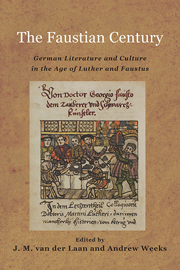Book contents
- Frontmatter
- Contents
- List of Illustrations
- Acknowledgments
- Introduction: Faust Scholarship and the Project at Hand
- 1 The German Faustian Century
- 2 Faustus of the Sixteenth Century: His Life, Legend, and Myth
- 3 Cornelius Agrippa's Double Presence in the Faustian Century
- 4 Converging Magical Legends: Faustus, Paracelsus, and Trithemius
- 5 Faust from Cipher to Sign and Pious to Profane
- 6 The Aesthetics of the 1587 Spies Historia von D. Johann Fausten
- 7 The Lutheran Faust: Repentance in the Augsburg Confession and the German Faustbuch
- 8 Marriage in the Historia von D. Johann Fausten (1587)
- 9 Antiauthoritarianism and the Problem of Knowledge in the Faustbuch
- 10 Exploring the “Three-Fold World”: Faust as Alchemist, Astrologer, and Magician
- 11 The Devil in the Early Modern World and in Sixteenth-Century German Devil Literature
- 12 Encounters with “Schwarz-Hans”: Jacob Böhme and the Literature of the Devil in the Sixteenth Century
- 13 D. Johann Faust and the Cannibals: Geographic Horizons in the Sixteenth Century
- A Sixteenth-Century Chronology of Significant References to Faust with Parallel World Events
- Select Bibliography
- Notes on the Contributors
- Index
8 - Marriage in the Historia von D. Johann Fausten (1587)
Published online by Cambridge University Press: 05 May 2013
- Frontmatter
- Contents
- List of Illustrations
- Acknowledgments
- Introduction: Faust Scholarship and the Project at Hand
- 1 The German Faustian Century
- 2 Faustus of the Sixteenth Century: His Life, Legend, and Myth
- 3 Cornelius Agrippa's Double Presence in the Faustian Century
- 4 Converging Magical Legends: Faustus, Paracelsus, and Trithemius
- 5 Faust from Cipher to Sign and Pious to Profane
- 6 The Aesthetics of the 1587 Spies Historia von D. Johann Fausten
- 7 The Lutheran Faust: Repentance in the Augsburg Confession and the German Faustbuch
- 8 Marriage in the Historia von D. Johann Fausten (1587)
- 9 Antiauthoritarianism and the Problem of Knowledge in the Faustbuch
- 10 Exploring the “Three-Fold World”: Faust as Alchemist, Astrologer, and Magician
- 11 The Devil in the Early Modern World and in Sixteenth-Century German Devil Literature
- 12 Encounters with “Schwarz-Hans”: Jacob Böhme and the Literature of the Devil in the Sixteenth Century
- 13 D. Johann Faust and the Cannibals: Geographic Horizons in the Sixteenth Century
- A Sixteenth-Century Chronology of Significant References to Faust with Parallel World Events
- Select Bibliography
- Notes on the Contributors
- Index
Summary
The Historia von D. Johann Fausten marks the beginning of a widely received rendition of the Faust legend. Although written anonymously, the Faust book is generally presumed to have been created by a sophisticated proponent of the Lutheran cause during the mid-sixteenth century. At first examination, its components often seem irreconcilably diverse: sophisticated theology, bawdy sexual exploits, provincial religiosity, crude pranks, and extensive excerpts from contemporary reference sources all appear in the text. Yet, within this varied environment, there are observable consistencies. This chapter focuses on the closely related themes of marriage and sexuality within the Faust book and the way they contribute to the structure and content of the Faust book as a unified work.
There are two points in the Historia at which Faust is accused of violating the terms of his pact with the devil, and the devil deals with him violently until he complies with his dictates. The first incident occurs very early in the text, in the tenth chapter. After concluding the pact and then setting up house with the riches to which he now has access, Faust proceeds as one might expect of a newly established early modern Protestant man: he seeks a wife and announces to Mephostophiles his intention to marry. Arguing that Faust had promised to be an enemy of both God and all Christians in his contract, that since one is incapable of serving two masters, and that marriage is a work of God, Mephostophiles attempts to dissuade him: “wirst du dich versprechen zuverehelichen/soltu gewiβlich von vns zu kleinen Stücken zerissen werden” (if you promise yourself in marriage, you shall certainly be ripped into small pieces by us).
- Type
- Chapter
- Information
- The Faustian CenturyGerman Literature and Culture in the Age of Luther and Faustus, pp. 197 - 214Publisher: Boydell & BrewerPrint publication year: 2013



